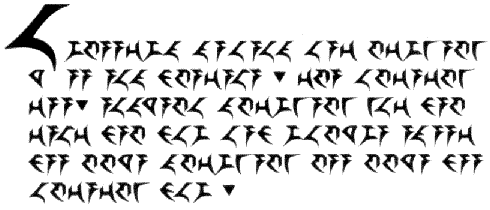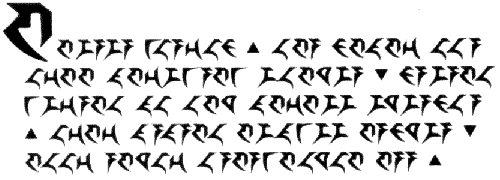Punctuating Klingon
This is an attempt at figuring out how punctuation could (should?) work in Klingon. The article mostly focuses on romanized Klingon (i.e. Klingon written with the roman alphabet – as opposed to pIqaD), and an attempt is made to analyze Okrand’s usage of punctuation characters.
A little bit of information about pIqaD is tossed in at the end however, but you might want to refer to »pIqaD, and How to Read It« for more information on the Klingon writing system.
Table of Contents
Okrand’s Way
Sentence Punctuation
When reading The Klingon Dictionary I was struck by the fact that Okrand seem to most carefully avoid using punctuation in Klingon sentences. – There is only one Klingon sentence in the entire book that contains any punctuation mark, and that occurs in the addendum (written for the second edition, seven years after the book was originally published). The sentence does not occur as an example, isolated from the surrounding text (like most other sentences), but is instead added as a final remark at the end of piece of a text in English. The sentence? Oh! It is: »taHjaj boq.« (May the alliance endure.)
It looks as if Okrand early on decided to avoid taking a stance on how punctuation should work in Klingon – which worked well for any sentence occurring on its own, or in quotation marks – but when faced with an off-hand Klingon remark inside an English text (where missing punctuation marks would have looked weird) he changed his mind (or forgot).
With only TKD as an example, we already have an indication that the punctuation is mostly there for the benefit of the Terran reader, and for the flow of the text as a whole.
Reading The Klingon Way and Klingon for the Galactic Traveler, this impression is given further credence – there does not seem be any connection between the meaning of a Klingon sentence and its punctuation. Instead the punctuation used is the same as in the English translation of the sentence. Some examples of imperative sentences (one would expect all of them to end in an exclamation point!):
| Klingon | Given Translation | ? | Source |
|---|---|---|---|
| bI’IQchugh yIvang! | If you are sad, act! | ! | TKW p.8 |
| tIqIpqu’ ’ej nom tIqIp. | Hit them hard and hit them fast. | . | TKW p.8 |
| Hoch ’ebmey tIjon. | Capture all opportunities. | . | TKW p.51 |
| pIpyuS yIghor! | Break a pipius! | ! | TKW p.185 |
| ghewmey tISuqQo’. | Don’t catch any bugs. | . | TKW p.207 |
| jagh tIHIv! | Attack the enemies! | ! | KGT p.140 |
And some examples of statements (which one would expect to all end with a period):
| Klingon | Given Translation | ? | Source |
|---|---|---|---|
| taHjaj boq. | May the alliance endure. | . | TKDa p.173 |
| tlhIngan maH! | We are Klingons! | ! | TKW p.3 |
| Hovmey Davan. | You salute the stars. | . | TKW p.83 |
| qagh Sopbe’! | He doesn’t eat gagh! | ! | TKW p.137 |
| Doq bIQtIq bIQ. | The river water is red. | . | KGT p.123 |
| Suy SoH. | You are a merchant. | . | KGT p.196 |
Luckily, for the most part, Klingon doesn’t need much in way of punctuation – questions and commands are always clearly marked.[1]
Sub-Sentence Punctuation
Punctuation is not only useful at the end of the sentence, but can also be used to separate clauses, and otherwise help to make a sentence’s internal structure become easier to grasp. In fact – in Klingon – this is probably where punctuation can help the most.
I think Okrand is a little more consistent when it comes to sub-sentence punctuation, though this will have to become the target for some future research. Especially in similes he is very consistent in his use of semicolon in the »<stative verb>; <noun> rur« pattern (e.g. ram; ghIlab ghew rur It is trivial as a glob fly).
Here are some cases to think about when I get back to this the next time:
- With conjunctions? – Both sentence and noun conjunctions.
- Complex sentences? [TKD p.61]
- Subordinate clauses [TKD p.62] – I.e. sentences with verb ending in
type 9 suffix (except -wI’), the two sentences follow each other in any
order. – Does this mean one period; a period and a comma; or two
periods?
- Relative clauses? [TKD p.63] – I.e. a sentence whose verb ends in the type 9 suffix -bogh which, this sentence goes into subject or object position in another sentence. – Probably just a period after this one?
- Purpose clauses? [TKD p.64] – .e. a sentence whose verb ends in the type 9 suffix -meH, this sentence always come first in the complex sentence. – Just a period after this one, or a comma and period?
- Sentences as objects? [TKD p.65] – I.e. one sentence containing the one of the pronouns ’e’ or net, with a preceding sentence as object. – Just a period after this one, or a comma and period?
- vIneH [TKD p.67] – Same as sentence-as-object, but second sentence not preceded by ’e’ or net. – Just a period after this one, or a comma and period?
- Verbs of speaking (say, tell, ask etc.) [TKD p.67] – Practically the same thing as sentence-as-object, but the sentences can occur in any order. – Just a period after this one, or a comma and period?
- rIntaH [TKD p.67] – Demonstrating that an action is complete. Follows a sentence. – Just a period after this one, or a comma and period?
- ”To be” constructions? [TKD p.67] – E.g. »puqpu’ chaH qama’pu’’e’.« – Should pronoun be followed by comma?
- Comparatives/superlatives? [TKD p.70] – I.e. the law’/puS construction. – Is law’ followed by a comma?
- Direct address? [TKD p.58] – I.e. calling someone by name or title. The direct address follows or precede the sentence. – But should a comma separate sentence and address?
- Separating nouns that are not noun-noun constructions? – Commas?
| Canon Examples | |
|---|---|
|
,
comma |
bogh tlhInganpu’, SuvwI’pu’ moj, Hegh. [TKW p.5]
ta’mey Dun, bommey Dun. [TKW p.15] batlh qelDI’ tlhIngan, lumbe’. [TKW p.67] wej Heghchugh vay’, SuvtaH SuvwI’. [TKW p.88] qanchoHpa’ qoH, Hegh qoH. [TKW p.117] wa’ SuvwI’ muHlu’DI’, tuHchoH Hoch SuvwI’pu’. [TKW p.136] Qu’ buSHa’chugh SuvwI’, batlhHa’ vangchugh, qoj matlhHa’chugh, pagh ghaH SuvwI’’e’. [TKW p.139] nuHlIj DawIvpu’, vaj yISov! [TKW p.151] QaghmeylIj tichID, yIyoH. [TKW p.212] |
|
;
semi-colon |
bISuv ’e’ yIwIv; bISutlh ’e’ yIwIvQo’. [TKW p.19]
qanchoHpa’ qoH, Hegh qoH. [TKW p.117] vangDI’ tlhIngan SuvwI’ ngoy’ qorDu’Daj; vangDI’ qorDu’ ngoy’ tlhIngan SuvwI’. [TKW p.155] wa’ jaj ’etlh ’uchchoHlaH tlhIngan puqloD; jajvetlh loD nen moj. [TKW p.177] |
pIqaD Punctuation
Special thanks to Nick Nicholas for telling me about pIqaD punctuation:
pIqaD punctuation exists, and is featured on the Klingon trading cards with Okrandian canon text: an upturned filled triangle, and its upside down counterpart. There is no correlation between pIqaD translation and the romanized gloss or English gloss punctuation that I could discern; it seems reasonable to treat the upturned version as a full stop (period), and the downturned version as a semicolon or comma. (cf. Greek punctuation: lower stop = full stop; upper stop = semicolon.)
I mean, the downturned version as comma. Oh, and there’s nothing complex about Greek punctuation, contra to what you now say on your web page :-) ; simple, upper stop in Greek corresponds to the Roman semi-colon. (For that matter, middle stop – used for Ancient but not Modern texts – corresponds to colon; indeed, middle stop and upper stop are usually not distinguished.) I just speculated that, if Klingon had two punctuation symbols, one would be a full stop, and the other would cover both semicolon and colon.



Footnotes
- Questions always have either the interrogative suffix -’a’ attached to the verb, or one of the question words (chay’, ghorgh, nuq, nuqDaq, qatlh, ’ar or ’Iv) present in the sentence. – Commands always have one of the imperative prefixes (yI-, pe-, tI-, gho- or HI-) attached to the verb.